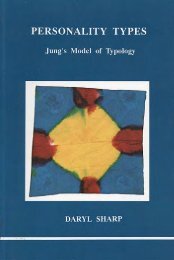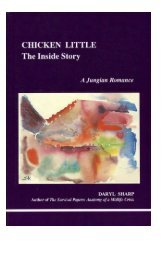Digesting Jung: Food for the Journey - Inner City Books
Digesting Jung: Food for the Journey - Inner City Books
Digesting Jung: Food for the Journey - Inner City Books
Create successful ePaper yourself
Turn your PDF publications into a flip-book with our unique Google optimized e-Paper software.
On Becoming Conscious 85<br />
especially true when we don’t reckon with <strong>the</strong> uncivilized, tenmillion-year-old<br />
animal in us.<br />
That being said, unexamined instinctual behavior is a hallmark of<br />
unconsciousness and a notable characteristic of <strong>the</strong> undeveloped<br />
personality. Through analysis one can become conscious of <strong>the</strong> instincts<br />
and <strong>the</strong> many ways in which we are slaves to <strong>the</strong>m. But this<br />
is not done with a view to giving <strong>the</strong>m boundless freedom. The aim<br />
is ra<strong>the</strong>r to incorporate <strong>the</strong>m into a purposeful whole.<br />
<strong>Jung</strong> defined consciousness as “<strong>the</strong> function or activity which<br />
maintains <strong>the</strong> relation of psychic contents to <strong>the</strong> ego.” 75 In that way<br />
he distinguished it conceptually from <strong>the</strong> psyche itself, which is<br />
comprised of both consciousness and <strong>the</strong> unconscious. Also, although<br />
we speak of ego-consciousness, in <strong>Jung</strong>’s model <strong>the</strong> ego is<br />
not <strong>the</strong> same thing as consciousness, but simply <strong>the</strong> dominant complex<br />
of <strong>the</strong> conscious mind. Of course, in practice we can only become<br />
aware of psychic contents by means of <strong>the</strong> ego. In o<strong>the</strong>r<br />
words, <strong>the</strong> more we know about what’s going on in our unconscious,<br />
<strong>the</strong> more conscious we become.<br />
Becoming conscious preeminently involves discriminating between<br />
opposites. Since <strong>the</strong> basic opposites are consciousness and<br />
<strong>the</strong> unconscious, <strong>the</strong> first hurdle is to acknowledge that <strong>the</strong>re are<br />
some things about ourselves we’re not aware of. Those who cannot<br />
do this are doomed <strong>for</strong>ever to skim <strong>the</strong> surface of life. For those<br />
who can admit to ano<strong>the</strong>r side of <strong>the</strong>mselves, <strong>the</strong>re is <strong>the</strong>n <strong>the</strong><br />
daunting task of discriminating between a whole range of o<strong>the</strong>r opposites—thinking<br />
and feeling, masculine and feminine, good and<br />
evil, and so on. And <strong>the</strong>n <strong>the</strong>re is <strong>the</strong> crucial difference between<br />
inner and outer, oneself and o<strong>the</strong>rs.<br />
<strong>Jung</strong> describes two distinct ways in which consciousness is enlarged.<br />
One is during a moment of high emotional tension involving<br />
a situation in <strong>the</strong> outer world. We feel uneasy <strong>for</strong> no obvious reason,<br />
or strangely attracted to someone, and suddenly we understand<br />
what’s going on. The o<strong>the</strong>r way is what happens in a state of quiet<br />
75 “Definitions,” Psychological Types, CW 6, par. 700.










